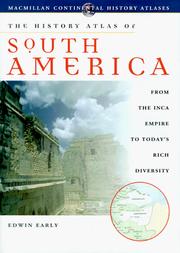| Listing 1 - 9 of 9 |
Sort by
|
Multi
ISBN: 9781108484060 9781108688451 9781108735483 Year: 2020 Publisher: Cambridge Cambridge University Press
Abstract | Keywords | Export | Availability | Bookmark
 Loading...
Loading...Choose an application
- Reference Manager
- EndNote
- RefWorks (Direct export to RefWorks)
Almost no one knew what a potato was in 1500. Today they are the world's fourth most important food crop. Feeding the People traces the global journey of this popular foodstuff from the Andes to everywhere. The potato's global history makes visible the ways in which our ideas about eating are entangled with the emergence of capitalism and its celebration of the free market. The potato's story also reminds us that ordinary people make history in ways that continue to shape our lives. Potatoes, in short, are a good way of rethinking the origins of our modern world. Feeding the People tells the story of how eating became part of statecraft, and provides a new account of the global spread of one of the world's most important foods. --
World history --- anno 1500-1799 --- anno 1800-1999 --- Potatoes --- Pomme de terre --- History. --- Histoire --- Histoire.
Book
ISBN: 9781107003422 9781139421652 1139421654 9780511763359 0511763352 9781139423694 113942369X 9781139419604 1139419609 1107003423 1107226929 9781107226920 1139411268 9781139411264 1280682884 9781280682889 9786613659828 6613659827 1139422626 9781139422628 9781107693296 113941755X 1107693292 Year: 2012 Publisher: Cambridge, UK
Abstract | Keywords | Export | Availability | Bookmark
 Loading...
Loading...Choose an application
- Reference Manager
- EndNote
- RefWorks (Direct export to RefWorks)
This fascinating history explores the dynamic relationship between overseas colonisation and the bodily experience of eating. It reveals the importance of food to the colonial project in Spanish America and reconceptualises the role of European colonial expansion in shaping the emergence of ideas of race during the Age of Discovery. Rebecca Earle shows that anxieties about food were fundamental to Spanish understandings of the new environment they inhabited and their interactions with the native populations of the New World. Settlers wondered whether Europeans could eat New World food, whether Indians could eat European food and what would happen to each if they did. By taking seriously their ideas about food we gain a richer understanding of how settlers understood the physical experience of colonialism and of how they thought about one of the central features of the colonial project. The result is simultaneously a history of food, colonialism and race.
Spaniards --- Imperialism --- Human body --- Food habits --- Food --- Ingestion --- Eating --- Food intake --- Nutrient intake --- Absorption (Physiology) --- Phagocytosis --- Foods --- Dinners and dining --- Home economics --- Table --- Cooking --- Diet --- Dietaries --- Gastronomy --- Nutrition --- Food customs --- Foodways --- Human beings --- Habit --- Manners and customs --- Oral habits --- Body, Human --- Body image --- Human anatomy --- Human physiology --- Mind and body --- Colonialism --- Empires --- Expansion (United States politics) --- Neocolonialism --- Political science --- Anti-imperialist movements --- Caesarism --- Chauvinism and jingoism --- Militarism --- Spanish people --- Ethnology --- Attitudes --- History. --- Social aspects --- Psychological aspects --- Latin America --- Spain --- Espagne --- Espainiako Erresuma --- España --- Espanha --- Espanja --- Espanya --- Estado Español --- Hispania --- Hiszpania --- Isupania --- Kingdom of Spain --- Regne d'Espanya --- Reiaume d'Espanha --- Reino de España --- Reino d'Espanya --- Reinu d'España --- Sefarad --- Sepharad --- Shpanie --- Shpanye --- Spanien --- Spanish State --- Supein --- イスパニア --- スペイン --- Asociación Latinoamericana de Libre Comercio countries --- Neotropical region --- Neotropics --- New World tropics --- Spanish America --- Colonization --- Social aspects. --- Colonies --- Race relations --- Social conditions. --- Primitive societies --- Arts and Humanities --- History

ISBN: 1840142103 Year: 1999 Publisher: Aldershot Ashgate
Abstract | Keywords | Export | Availability | Bookmark
 Loading...
Loading...Choose an application
- Reference Manager
- EndNote
- RefWorks (Direct export to RefWorks)
Letters --- Letter writing --- 091-055.2 --- 091:82-6 --- 82-6 --- 82-6 Brief --- Brief --- 82-6 Letters. Art of letter-writing. Correspondence. Genuine letters. Other works in epistolary form --- Letters. Art of letter-writing. Correspondence. Genuine letters. Other works in epistolary form --- 091-055.2 Handschriftenkunde. Handschriftencatalogi--Vrouwen --- Handschriftenkunde. Handschriftencatalogi--Vrouwen --- 091:82-6 Handschriftenkunde. Handschriftencatalogi-:-Brief --- Handschriftenkunde. Handschriftencatalogi-:-Brief --- Correspondence --- English letter writing --- Letter writing, English --- Writing of letters --- Authorship --- Biographical sources --- Literature --- History and criticism --- History --- Literary semiotics --- anno 1600-1699 --- anno 1800-1999 --- anno 1700-1799
Book
ISBN: 1108688454 1108585221 1108645305 1108484069 Year: 2020 Publisher: Cambridge : Cambridge University Press,
Abstract | Keywords | Export | Availability | Bookmark
 Loading...
Loading...Choose an application
- Reference Manager
- EndNote
- RefWorks (Direct export to RefWorks)
Potatoes are the world's fourth most important food crop, yet they were unknown to most of humanity before 1500. Feeding the People traces the global journey of this popular foodstuff from the Andes to everywhere. The potato's global history reveals the ways in which our ideas about eating are entangled with the emergence of capitalism and its celebration of the free market. It also reminds us that ordinary people make history in ways that continue to shape our lives. Feeding the People tells the story of how eating became part of statecraft, and provides a new account of the global spread of one of the world's most successful foods.
Potatoes --- Irish potatoes --- Solanum tuberosum --- White potatoes --- Solanum --- History.
Book
ISBN: 9586959864 9789586959865 Year: 2014 Publisher: Bogotá: Universidad de Los Andes. Facultad de ciencias sociales. Departamento de historia,
Abstract | Keywords | Export | Availability | Bookmark
 Loading...
Loading...Choose an application
- Reference Manager
- EndNote
- RefWorks (Direct export to RefWorks)
Book
ISBN: 9781501344312 1501344315 Year: 2019 Publisher: New York (N.Y.) : Bloombury,
Abstract | Keywords | Export | Availability | Bookmark
 Loading...
Loading...Choose an application
- Reference Manager
- EndNote
- RefWorks (Direct export to RefWorks)
Baked potatoes, Bombay potatoes, pommes frites . . . everyone eats potatoes, but what do they mean? To the United Nations they mean global food security (potatoes are the world's fourth most important food crop). To 18th-century philosophers they promised happiness. Nutritionists warn that too many increase your risk of hypertension. For the poet Seamus Heaney they conjured up both his mother and the 19th-century Irish famine.
Potatoes --- Potatoes --- Potatoes --- Potatoes. --- History. --- Social aspects. --- Social aspects.
Book
ISBN: 150134434X 1501344323 1501344331 9781501344329 9781501344336 9781501344312 1501344315 Year: 2019 Publisher: New York, NY : Bloombury Academic,
Abstract | Keywords | Export | Availability | Bookmark
 Loading...
Loading...Choose an application
- Reference Manager
- EndNote
- RefWorks (Direct export to RefWorks)
"Object Lessons is a series of short, beautifully designed books about the hidden lives of ordinary things. Baked potatoes, Bombay potatoes, pommes frites . . . everyone eats potatoes, but what do they mean? To the United Nations they mean global food security (potatoes are the world's fourth most important food crop). To 18th-century philosophers they promised happiness. Nutritionists warn that too many increase your risk of hypertension. For the poet Seamus Heaney they conjured up both his mother and the 19th-century Irish famine. What stories lie behind the ordinary potato? The potato is entangled with the birth of the liberal state and the idea that individuals, rather than communities, should form the building blocks of society. Potatoes also speak about family, and our quest for communion with the universe. Thinking about potatoes turns out to be a good way of thinking about some of the important tensions in our world. Object Lessons is published in partnership with an essay series in The Atlantic."--Bloomsbury publishing.
Potatoes --- History. --- Social aspects.
Digital
ISBN: 9780511763359 Year: 2012 Publisher: Cambridge Cambridge University Press
Abstract | Keywords | Export | Availability | Bookmark
 Loading...
Loading...Choose an application
- Reference Manager
- EndNote
- RefWorks (Direct export to RefWorks)


ISBN: 0028625838 Year: 1998 Publisher: New York : Macmillan,
Abstract | Keywords | Export | Availability | Bookmark
 Loading...
Loading...Choose an application
- Reference Manager
- EndNote
- RefWorks (Direct export to RefWorks)
South America --- Amérique du Sud --- History --- Maps --- Histoire --- Cartes
| Listing 1 - 9 of 9 |
Sort by
|

 Search
Search Feedback
Feedback About UniCat
About UniCat  Help
Help News
News